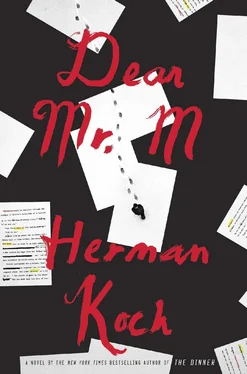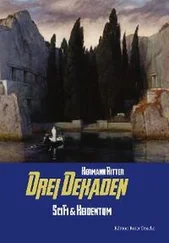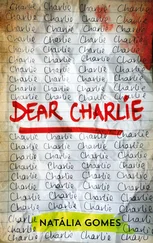There are books in which the writer appears as well. As a character. Or there’s a character in the book who enters into a discussion with the writer. I’m sure you know the books I’m talking about. You wrote some of them yourself.
That’s what makes this different. I’m not a character. I’m real.
In high school, something happened that changed the rest of my life. In high school, children spread their wings. They no longer test their boundaries to the point where they’ve been drawn, they go beyond them. They no longer see their parents and teachers as adults who lead them by the hand, but as obstacles on the road to self-fulfillment. They crush an insect, just to see if they can do it, and then feel regret — or not.
The new material starts here. I doubt whether you can do anything with it. But whatever the case: here’s where it starts.
It was the year when teachers were dropping like flies. Suddenly, there they went. Not a month passed without the entire Spinoza Lyceum being summoned to the auditorium, where Principal Goudeket would make yet another “sad announcement.” Of course you had to keep your mouth shut and look serious, but what we mostly felt was a sense of justice having been done. The announcements never made us sad. There was something comforting about this massive falling by the wayside. If only by reason of their age, teachers were turning out to be vulnerable. They were not, in any case, immortal, not like we were.
A teacher who that very afternoon had been carping at you about the homework you hadn’t done or about your general lack of enthusiasm might not show up at school at all the next morning. That none of these deaths were preceded by a long sickbed served to amplify the comforting effect. No endless hospitalizations, failed radiotherapy, or other delays — nothing that could have made the dying any more human.
Mr. Van Ruth was our math teacher. Whenever someone’s attention lagged, he would point threateningly out the window at the Rietveld School of Art & Design, a few hundred yards from our school but hidden by the trees, and say: “If you’d rather play with clay and crayons, they’ve got a place for you.”
Suddenly, one morning, he didn’t show up. It was the day after an early autumn storm, the trees had already lost some of their leaves and so, for the first time that year, the tip of a roof at the Rietveld School was visible through the branches. I remember clearest of all the empty space in front of the chalkboard, never again to be filled by his lanky frame.
I thought about the morning of the day before, when Mr. Van Ruth had put on his socks and shoes before cycling as usual to the Spinoza Lyceum.
Mr. Karstens used to sit on an especially high stool behind his desk in the physics lab, which was supposed to make him look less short. “There are some people present in this room who will never understand a thing about physics,” he said on Monday morning, breathing a deep sigh. On Tuesday he was dead.
During the memorial service in the auditorium, Principal Goudeket found it fitting to refer to Mr. Karstens’s family situation. We found out, for example, that the physics teacher did not have a wife, but two “growing boys” he cared for on his own. The principal left out the important details. Was Mr. Karstens’s wife still alive? Or were the two growing boys now completely on their own?
Whatever the case, the detail about the sons added a human twist to the man’s death. Besides being a physics teacher who was ashamed of his own dwarfish stature, and who therefore never dared to come down off his high stool even once during the whole period, he was suddenly also a father with two growing boys who waited for him to come home.
But the sons had never been in the picture before, no one had ever seen them in real life, which served in turn to almost completely undermine the human element. There was even a remote possibility that they were just as relieved as we were. That’s right, maybe the growing boys were above all relieved, because at last they could do whatever they wanted — go to the snack bar for takeout every night and stay up watching TV until far past midnight — and no longer had to walk down the street beside a father who was too short.
But such possibilities invariably went unspoken during the memorial services in the auditorium at the Spinoza Lyceum, so that we were left only with the image of two growing boys sitting in a darkened kitchen, their empty plates in front of them, waiting, because there was no one left to take care of them.
Miss Posthuma lived by herself on the ninth floor of an apartment building close to the road going out of town to Utrecht. I had been to her home once to discuss my reading list for that year’s English lit class. From her living room window you could see the rowers skimming across the mirrored water of the River Amstel. And later, as darkness fell, you saw the lights of cars on the highway crossing the Utrecht Bridge. Somewhere a clock was ticking. Miss Posthuma asked if I wanted another cup of tea. She had hair that she kept short and wore in tight little curls and she had a high voice, without any real bass to it, the kind one often hears in women who have never had an orgasm in all their born days. It was a voice that fluttered around the room like a little bird, without landing anywhere, as though anchored to nothing and not really connected to the earth; just like Miss Posthuma, in fact, in her ninth-floor apartment high above the world and the people in it.
Then, suddenly, I clearly heard that voice ask if perhaps I preferred something other than tea, that she probably had a bottle of beer somewhere in the fridge. I saw too that something broke in her expectant expression when I stood up and said it was time for me to be getting home. Something in her face shifted color almost unnoticeably. Out on the street I looked up one last time at the ninth floor of the building, but there was nothing about the lights along the outside gallery to show which apartment was hers.
It didn’t cause much consternation when Miss Posthuma didn’t show up at the Spinoza Lyceum one morning. Only later did I hear that they’d had to break down the door to her apartment. But Goudeket’s memorial speech never once mentioned the word “crowbars.” It was clear as a bell that the principal had been unable to find anything worthy of note as theme for his little speech. This time there were no growing boys or other pathetic or heartwarming details to make Miss Posthuma, who had been found dead in her own home, a little more human. Goudeket came up with nothing better than “her enormous dedication to our school and her pupils”; under the hard fluorescent lighting of the half-empty auditorium, that sounded like less than nothing, as though the big oblivion might as well get started right then and there.
And then there was that one spectacular finish, a finish that went out with a resounding bang, flying glass, and blood. Harm Koolhaas (“Harm” to the juniors and seniors who had social studies with him) made his mistake less than half an hour after a midnight landing in Miami, when he took a wrong exit in his rental car, a white Chevrolet Malibu, and ended up in “the wrong neighborhood” (thus spake Goudeket).
The two men he asked for directions at the badly lit gas station were never found. It appears that Harm Koolhaas had tried to roll up the window on the driver’s side and back away fast, but that this maneuver ended with a loud smack against a parked car. According to the gas station owner’s testimony, one of the men had just enough time to poke the barrel of his pistol through the crack in the window. Meanwhile, the second man opened fire on the windshield.
Harm Koolhaas wore fairly fashionable corduroy trousers and carried a beaded bag over one shoulder, from which he would invariably produce his pack of Javaanse Jongens rolling tobacco at the end of class. When he walked down the hallway, it was always with a bit of a bounce in his step.
Читать дальше












